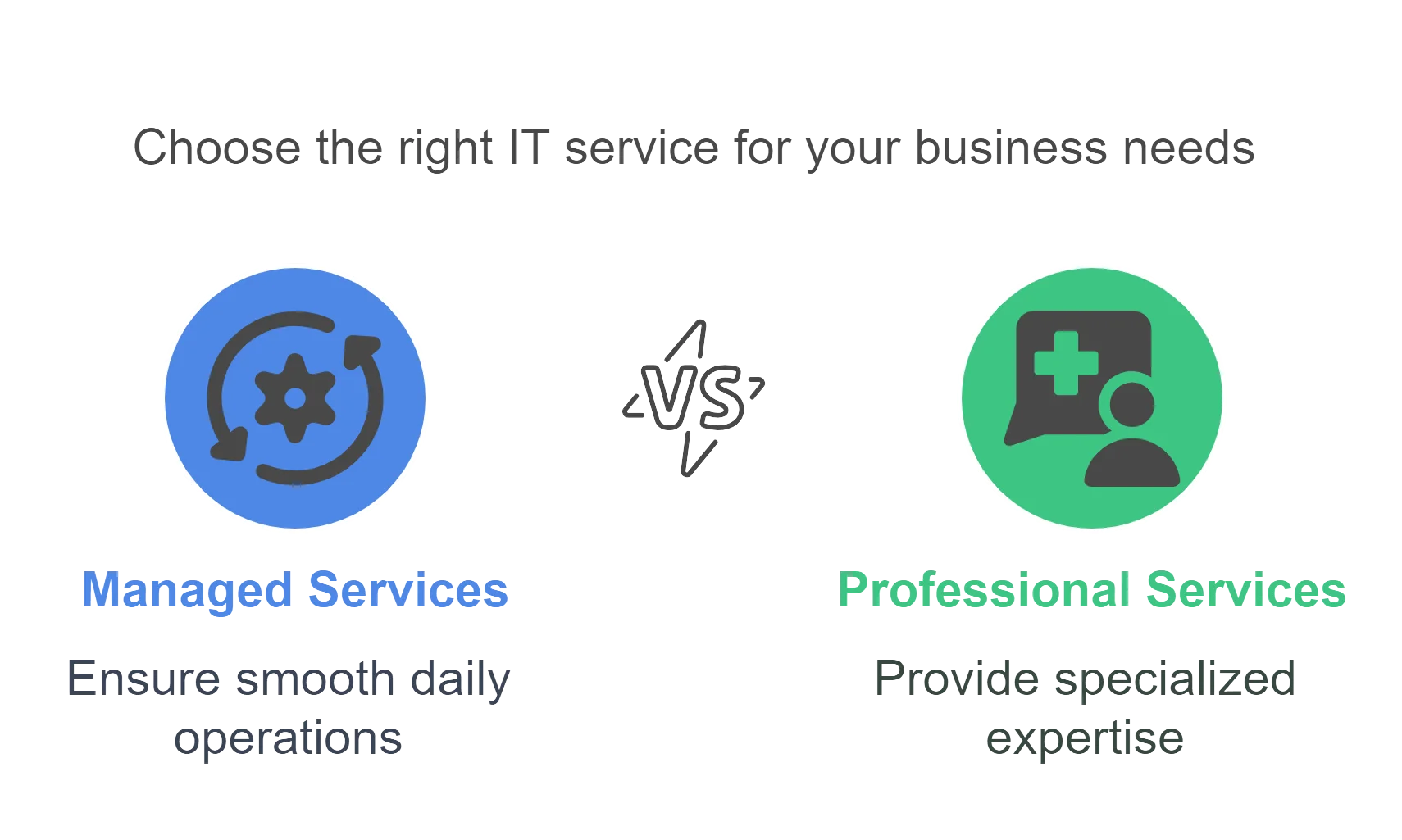
Managed Services vs. Professional Services: Which IT Model Is Right for You?
The way you structure IT support can either accelerate growth or quietly hold your business back. When systems are stretched thin and threats keep evolving, relying on the wrong model creates gaps that are hard to recover from. Today, 24% of IT decision-makers say cyber threats are their top challenge, a clear signal that reactive, disconnected approaches are no longer enough.
| As Bryan Fuller, CEO of Contigo Technology, says, “Smart IT leaders align service models with business strategy—not just technical needs.” |
That’s where the difference between managed services and professional services becomes critical. Each offers unique value—but understanding how they function, when to use them, and what they mean for your business is essential to building a secure, scalable, and efficient IT foundation.
Key Differences: Managed Services vs. Professional Services
Both managed and professional services come from experienced IT providers—but they serve different purposes.
Managed services offer ongoing IT support for your daily operations. You get a dedicated team monitoring your systems, handling support tickets, managing security, and keeping everything running in the background. Gain deeper insight into secure support models and how to evaluate the right provider for your business by visiting CloudSecureTech.
Professional services focus on short-term projects. You bring in experts for specific tasks like cloud migration, network design, or cybersecurity audits. Once the project is complete, the engagement ends.
Now let’s look at the core differences that matter most to your business.
1. Engagement Duration and Scope
The most obvious difference is the length and scope of the engagement.
With managed services, you’re entering a long-term relationship. Your provider handles everything from helpdesk support to network maintenance and backup management. They become an extension of your team, managing your IT environment continuously.
Professional services are short-term. You’re hiring someone to achieve a specific goal—like implementing Microsoft 365 or performing a security audit. There’s a defined start and end point. Once the job is done, the provider steps away unless another project comes up.
This difference is crucial. If you need full IT support every day, managed services are the way to go. If you’re tackling a one-time project, professional services make more sense.
2. Cost Structure
The pricing model is another major difference between managed services and rofessional services.
Managed services usually come with a fixed monthly fee. This includes a bundle of services like monitoring, patching, antivirus, backup, and helpdesk support. The predictable cost makes budgeting easier, especially for growing businesses.
Professional services are billed hourly or by project. You pay for the time and expertise required to complete a task. This can be more cost-effective for businesses that already have an internal IT team and only need extra help occasionally.
If you prefer predictable costs and full coverage, managed services offer better value. But if you need targeted, expert help for a single task, professional services can be the right fit.
Stop Wasting Time on the Wrong IT ApproachStreamline your operations with support designed to scale as you grow. |
3. Support Model
Managed services provide 24/7 support and proactive monitoring. The provider identifies and solves issues before they disrupt your business. You also get access to a helpdesk for end-user support, reducing downtime and frustration.
Professional services don’t offer ongoing support. You get help during the project, but once it’s finished, the engagement ends. If a problem arises later, you’ll need to start a new contract or resolve it internally.
If your business can’t afford IT downtime or reactive responses, managed services deliver faster help and better protection.
4. Expertise and Use Cases
Both service types involve skilled professionals, but their expertise is applied differently.
Managed services cover a wide range of functions—endpoint protection, system updates, cloud backups, and more. These teams handle everything your in-house IT team would, and often more, especially when it comes to scale.
Professional services offer specialized knowledge. If you’re launching a new infrastructure, integrating platforms, or assessing cybersecurity risks, you need someone with deep experience in that area.
A managed services provider keeps your business running day-to-day. A professional services consultant steps in when you need to build something new or fix something complex.

5. Ownership and Risk
With managed services, your provider takes responsibility for your IT environment. They’re accountable for system performance, security, and uptime. This shifts risk off your plate and gives you more confidence in your operations.
Professional services are different. The provider is responsible for delivering a result, but once the project is done, ongoing management and risk are back in your hands. If something breaks or needs updating later, you’ll need to handle it yourself or rehire for support.
If you want to reduce IT risk and hand over accountability, managed services are the better option.
Managed Services vs. Professional Services
| Feature | Managed Services | Professional Services |
| Engagement Duration | Ongoing | Short-term/project-based |
| Pricing Model | Fixed monthly fee | Hourly or per-project |
| Support Availability | 24/7 monitoring and helpdesk | Limited to project scope |
| Expertise Focus | Broad IT coverage | Specialized knowledge |
| Risk Ownership | Provider manages risk | Client manages after project ends |
| Best Fit For | Businesses needing full IT support | Businesses needing expert project help |
|
More articles you might like: |

Build a Smarter IT Foundation for Long-Term Growth
Understanding the key differences between managed services and professional services can help you make smarter decisions about how to support your IT environment.
Managed services give you long-term, proactive coverage that keeps your systems secure and your team productive. They’re ideal when you need reliable support, predictable pricing, and less risk. Professional services are perfect for short-term, project-based needs that require expert attention.
Contigo is a leading managed services provider that also offers professional services for project-specific goals. Whether you need ongoing IT support or one-time consulting, Contigo gives you expert guidance, fast response, and proven results.
Contact us today to talk through your needs and schedule a consultation.
|
Discover Trusted Managed IT Services Near You |

